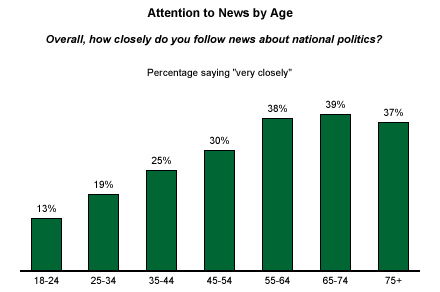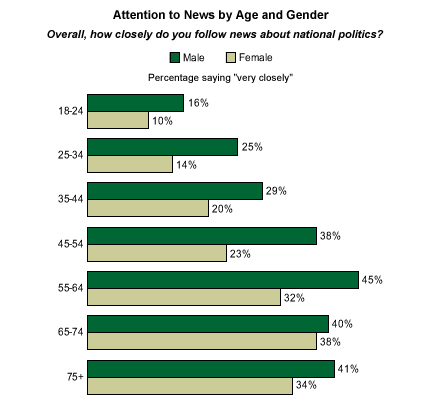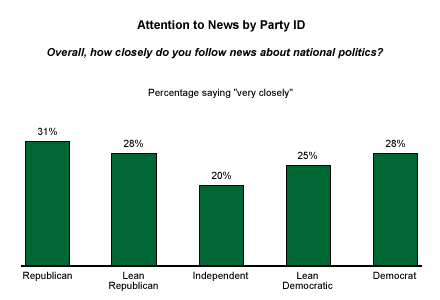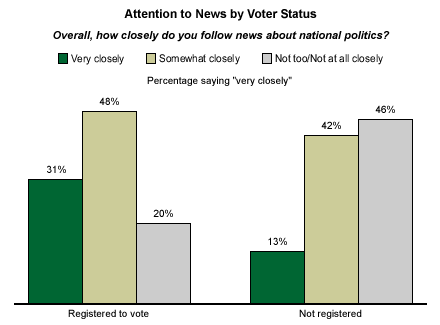When events such as the indictment of Republican leader Tom DeLay occur, it's tempting to look for evidence of a ripple effect in the broader political environment -- in this case, a possible decline of public trust in the Republican Party or even President George W. Bush. While trust may or may not erode in time, it is helpful to remember that most Americans are less than riveted to U.S. politics, and thus a seismic event inside the Washington, D.C., Beltway may barely be noticed outside of it.
Gallup has yet to do any polling on DeLay's situation, specifically. But we regularly track public attention to American politics with a question that asks: "Overall, how closely do you follow news about national politics -- very closely, somewhat closely, not too closely, or not at all?"
The most recent results come from the annual Governance poll, conducted Sept. 12-15, 2005. According to that survey, only about one in four of all national adults, 28%, follow the news about national politics very closely. Another 48% follow it somewhat closely, 18% say they follow it "not too closely," while 5% say they don't follow national politics at all.
The 28% paying very close attention is similar to what Gallup found in 2002 and 2003.
Last year, the percentage bumped up to 36%, but this was most likely because the poll was conducted during the height of the 2004 election season. An average of the last five Governance polls*, spanning 2001 to 2005, also puts the percentage paying very close attention to political news at 28%.
That 28% presumably represents a majority of the audience for the talking heads and chattering pundits who provide the daily news and then thrash it out 24/7. They are the attentive elite -- perhaps better known as "news junkies" -- whose early reactions to the news could be pivotal in how a political event plays out.
Attentive Elite Skews Older, More Partisan
So who are the attentive elite? According to Gallup's 2001-2005 data, attention to national politics is strongly correlated with age, and, at every age level, men are more likely than women to be highly attentive.
The percentage saying they follow the news of national politics very closely rises from 13% among 18- to 24-year-olds to 38% among those aged 55 to 64. Attention increases gradually among the intervening age groups, but then holds at the 38% level among those 55 and older.

Gallup finds that by a 33% to 23% margin, men are more likely than women to follow political news very closely. In other words, women are about a third less likely than men to be attentive. This ratio holds at almost every age group looked at. However, the gap between men and women narrows some among seniors.

Solid identifiers with either major political party are more likely to be attentive than are political independents. About 3 in 10 Republicans (31%) and Democrats (28%) say they pay very close attention to political news, compared with only 20% of pure independents (that is, independents who don't lean toward either the Republican or Democratic parties).

Attentiveness is clearly linked with political participation. Gallup's data from 2004 shows that those who closely follow political news were three times as likely (44% vs. 15%) to say they had voted in the 2000 election. More generally, registered voters are more than twice as likely as non-registered voters (31% vs. 13%) to say they follow the news closely. In fact, nearly half of non-registered voters admit they do not pay close attention to the news.

Bottom Line
When Washington insiders are looking for Americans' reactions to political news events, the first responders are presumably those paying closest attention to the news. They are the ones whose views are most likely to be affected by information or an event -- particularly when it is not a major event that gets saturation news coverage. Not only do relatively few Americans pay very close attention to political news, but those who do tend to be older and more strongly partisan, and therefore could be less susceptible to shifting their political attitudes.
*The aggregate database on which these results are based includes telephone interviews with 4,976 randomly selected national adults aged 18 and older, drawn from five separate surveys conducted each September from 2001 through 2005. Results based on the total sample have a margin of error of ±2 percentage points.
